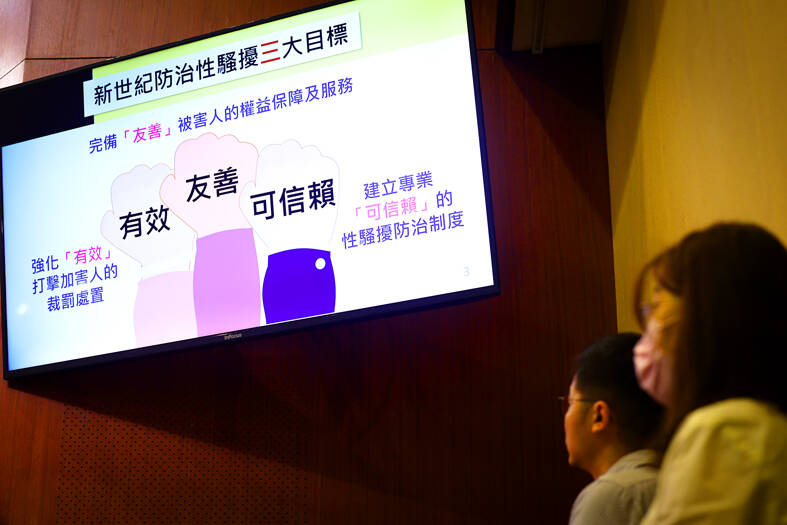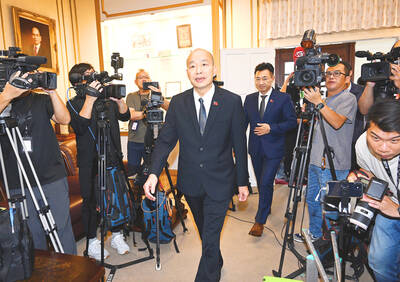The Executive Yuan yesterday approved amendments to gender equality laws that would impose stiffer penalties, including up to three years in prison and a maximum fine of NT$1 million (US$32,169) for offenders who use their position or power to sexually harass others.
The amendments to the Act of Gender Equality in Employment (性別平等工作法), the Gender Equity Education Act (性別平等教育法) and the Sexual Harassment Prevention Act (性騷擾防治法) were proposed following a series of harassment scandals that have been exposed since May, with perpetrators ranging from politicians to writers, academics and celebrities.
To facilitate their passage, the Legislative Yuan is to hold an extraordinary session starting next week, Executive Yuan officials said.

Photo: CNA
If the proposals are passed, about 10 supporting laws would still need to be in place before they can be fully implemented, the officials said.
The bills stipulate that the Gender Equity Education Act would apply in sexual harassment cases where students are involved, while the Act of Gender Equality in Employment would apply to the rest of the cases, said Minister Without Portfolio Lo Ping-cheng (羅秉成), who was in charge of coordinating government efforts to amend the laws.
The proposed amendment to the Gender Equity Education Act would close a loophole by including students in juvenile reformatory schools, and police and military academies, he said.
Penalties for sexual harassment by employers, government officials, school principals or people with authority would be stiffer than for general cases involving supervisors and workers, Lo said.
“Those who abuse their power to sexually harass others would not only face compensation lawsuits filed by victims, but they would be asked to pay for punitive damages as well,” he said. “The payment for punitive damages would be one to three times higher than the compensation granted to the victims if perpetrators fall under the general category. Offenders who are employers and school principals would have to pay three to five times the compensatory damage as penalty.”
Fines for perpetrators would be comprehensively increased through the amendments, Lo said.
The minimum administrative fine for general sexual harassment would be NT$10,000 to NT$200,000, he said.
Those who use their power to harass others would be fined between NT$60,000 and NT$600,000 under the general category, and between NT$10,000 and NT$1 million if the offenders are employers, Lo said.
They could also be jailed for up to three years, he added.
The amendments would allow sexual harassment victims to file complaints directly to gender equality officials in local governments if the offender is the employer or top representative of an organization, or victims are dissatisfied with the investigations conducted by employers, Lo said.
Local government officials should investigate sexual harassment complaints and issue punishments accordingly, he said.
Employers are obligated to report complaints of sexual harassment and their subsequent investigations to local gender equality officials, Lo said.
The statute of limitations for filing general sexual harassment complaints would be two years from the date a person reports the case and five years from when the incident occurred, he said.
In cases involving offenders who are employers or government officials, the statute of limitations would be three years from the date of the report and seven years from when it happened, Lo said.
If the sexual harassment occurred when the victim was a minor, the statute of limitations would be three years after they reach adulthood.
The government is not obligated to handle complaints of sexual harassment incidents that happened more than 10 years ago, he said.
The amendments would stipulate temporary measures to be taken when the top representative of an organization is involved in sexual harassment scandals, including suspending them from their duties or transferring them to a different position.

NON-NEGOTIABLE: The US president’s action ran counter to one of the US’ ‘six assurances’ on not consulting China about arms sales to Taiwan, US lawmakers said US President Donald Trump’s admission that he is discussing arms sales to Taiwan with Chinese President Xi Jinping (習近平) is “alarming and a blatant violation of US policy and the six assurances,” US Representative Ro Khanna said on Tuesday. Trump on Monday said he would decide soon on whether to send more weapons to Taiwan, after Xi warned him not to do so. “I’m talking to him about it. We had a good conversation, and we’ll make a determination pretty soon,” Trump told reporters aboard Air Force One when asked about warnings raised by Beijing during a phone call with Xi over

OPTIMISTIC: The DGBAS sharply upgraded its GDP growth estimate from 3.54 percent to 7.71 percent after the Taiwan-US trade agreement signing and given AI optimism The US imported more from Taiwan than China for the first time in decades, as US President Donald Trump’s tariffs reshape trade flows while a global boom in artificial intelligence (AI) fuels demand for tech products. US purchases of goods from China plunged almost 44 percent in December last year from 2024 to US$21.1 billion, US Department of Commerce data showed on Thursday. By contrast, shipments from Taiwan more than doubled during the same period to US$24.7 billion. The soaring Taiwanese shipments to the US reflect the huge expansion in supplies of chips and servers for AI companies, which has completely changed

VACILLATING? Some US officials are concerned that Trump’s April visit to Beijing might be affected if Washington pushes through additional weapons sales to Taiwan A major US arms sales package for Taiwan is in limbo following pressure from Chinese President Xi Jinping (習近平) and concerns among some US officials that greenlighting the deal would derail US President Donald Trump’s upcoming visit to Bejing, the Wall Street Journal (WSJ) reported on Wednesday. Trump on Monday said that he would decide soon on whether to send more weapons to Taiwan, after Xi warned him not to do so. “I’m talking to him about it. We had a good conversation, and we’ll make a determination pretty soon,” Trump told reporters aboard Air Force One when asked about warnings raised

TEAMWORK: All parties should prioritize national defense and key security issues, which requires cooperation and long-term, stable support, the DPP’s Chen Pei-yu said A proposed NT$1.25 trillion (US$39.66 billion) special defense budget would be a top priority for the Legislative Yuan when it reconvenes after the Lunar New Year holiday, Legislative Speaker Han Kuo-yu (韓國瑜) said yesterday after a group of 37 US lawmakers sent letters to Taiwanese politicians expressing concern over the stalled budget. Chinese Nationalist Party (KMT) members Han and Deputy Legislative Speaker Johnny Chiang (江啟臣) in a statement said they would help party caucuses deliberate about the special defense budget, adding that they value open, candid and sincere exchanges with the US Congress and take US lawmakers’ concerns seriously. Taiwan-US relations are